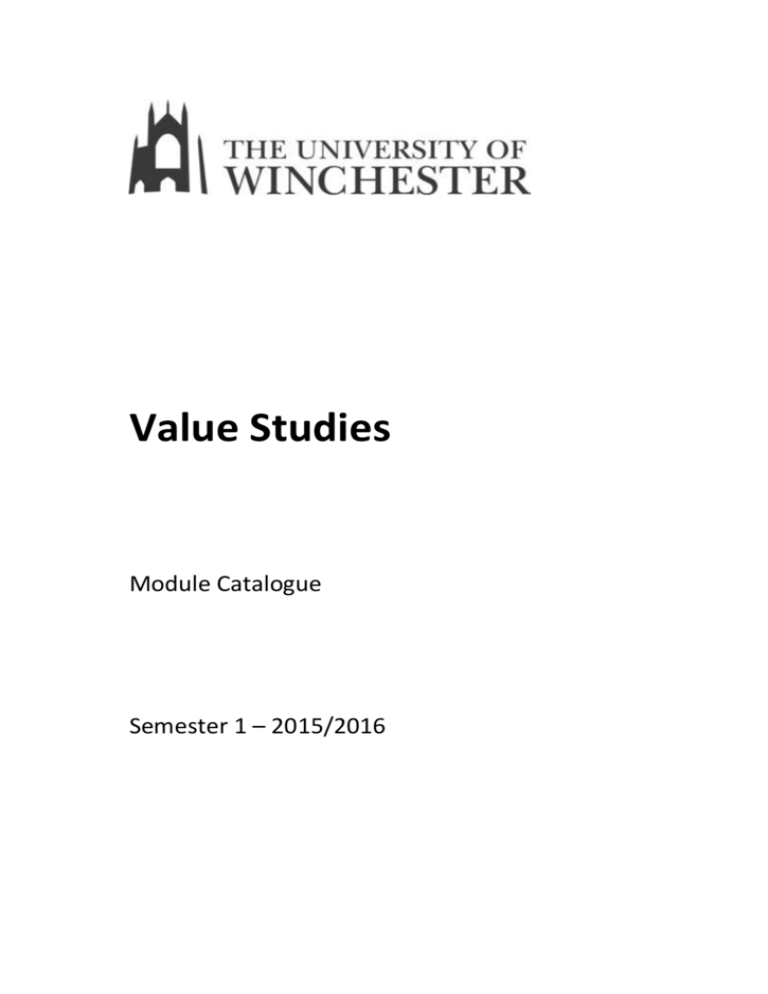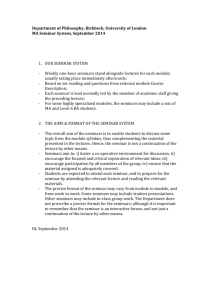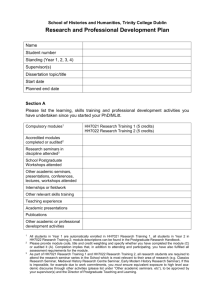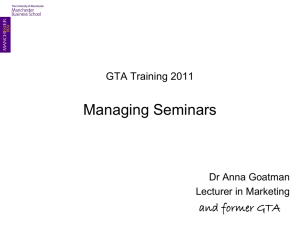Value Studies
advertisement

Value Studies Module Catalogue Semester 1 – 2015/2016 Module Code: Module Name: VA1001 Culture: High and Low Module Credits: No. of Periods: Level: Module Tutor: 15 1 Level 4 Thomas Norgaard Module Description: Ideas about 'culture' play a complex role in contemporary discussions about what matters in life. This module is designed to help students get a grip on this difficult concept and to introduce them to some of the fundamental questions that are being addressed when ideas about culture become central to our theoretical inquiries, practical projects and dramatic disagreements. Themes of the module include: the contested notions of high culture and mass culture, the distinction between culture and civilization, culture's relation to politics and social criticism, multiculturalism, culture and technology, performance culture, material culture, and cultural flourishing and devastation. The distinction between high and low, or highs and lows, runs like a red thread throughout the module and invites us to reflect on our basic assumptions about progress, decadence and hierarchy. Specific to: Assessments: VERSION A 001: 002: OR VERSION B Response papers (350 words each) - required for 9 out of 12 seminars Seminar participation 002: 003: Response papers (350 words each) - required for 5 out of 12 seminars Seminar participation Essay (1400 words) Availability: Occ. A Year 15/16 001: Semester S1 2 90% 10% 50% 10% 40% Module Code: Module Name: Module Credits: No. of Periods: Level: Module Tutor: VA1003 Other Animals: Contemporary Moral Frontiers 15 1 Level 4 Thomas Norgaard Module Description: The relation between humans and other animals constitutes one of the frontiers of moral life today. Qualms about factory farming and meat-eating are widespread. So are worries about animal experimentation and zoos. In this module, these various moral anxieties provide starting points for a series of inquiries into the current lives of non-human animals and their relation to us humans. How, and to what extent, do we understand other animals? What do we owe other animals, wild and tame? Is it true, as the animal rights movement insists, that we stand in deeply flawed relations to the other animals? And if so, what should we do about it? How, in a (more) ideal world, would humans and other animals relate to one another? What, in other words, are the values that should guide our relations to the other animals in the future? Specific to: Assessments: VERSION A 001: 002: OR VERSION B Response papers (350 words each) - required for 9 out of 12 seminars Seminar participation 002: 003: Response papers (350 words each) - required for 5 out of 12 seminars Seminar participation Essay (1400 words) Availability: Occ. A Year 15/16 001: Semester S1 3 90% 10% 50% 10% 40% Module Code: Module Name: VA2001 Culture: High and Low Module Credits: No. of Periods: Level: Module Tutor: 15 1 Level 5 Thomas Norgaard Module Description: Ideas about 'culture' play a complex role in contemporary discussions about what matters in life. This module is designed to help students get a grip on this difficult concept and to introduce them to some of the fundamental questions that are being addressed when ideas about culture become central to our theoretical inquiries, practical projects and dramatic disagreements. Themes of the module include: the contested notions of high culture and mass culture, the distinction between culture and civilization, culture's relation to politics and social criticism, multiculturalism, culture and technology, performance culture, material culture, and cultural flourishing and devastation. The distinction between high and low, or highs and lows, runs like a red thread throughout the module and invites us to reflect on our basic assumptions about progress, decadence and hierarchy. Specific to: Assessments: VERSION A 001: 002: OR VERSION B Response papers (450 words each) required for 9 out of 12 seminars Seminar participation 002: 003: Response Papers (450 words each) Required for 5 out of 12 seminars Seminar participation Essay (1800 words) Availability: Occ. A Year 15/16 001: Semester S1 4 90% 10% 50% 10% 40% Module Code: Module Name: VA2003 Other Animals: Contemporary Moral Frontiers Module Credits: No. of Periods: Level: Module Tutor: 15 1 Level 5 Thomas Norgaard Module Description: The relation between humans and other animals constitutes one of the frontiers of moral life today. Qualms about factory farming and meat-eating are widespread. So are worries about animal experimentation and zoos. In this module, these various moral anxieties provide starting points for a series of inquiries into the current lives of non-human animals and their relation to us humans. How, and to what extent, do we understand other animals? What do we owe other animals, wild and tame? Is it true, as the animal rights movement insists, that we stand in deeply flawed relations to the other animals? And if so, what should we do about it? How, in a (more) ideal world, would humans and other animals relate to one another? What, in other words, are the values that should guide our relations to the other animals in the future? Specific to: Assessments: VERSION A 001: 002: OR VERSION B Response papers (450 words each) required for 9 out of 12 seminars Seminar participation 002: 003: Response Papers (450 words each) Required for 5 out of 12 seminars Seminar participation Essay (1800 words) Availability: Occ. A Year 15/16 001: Semester S1 5 90% 10% 50% 10% 40% Module Code: Module Name: VA3001 Culture: High and Low Module Credits: No. of Periods: Level: Module Tutor: 15 1 Level 6 Thomas Norgaard Module Description: Ideas about 'culture' play a complex role in contemporary discussions about what matters in life. This module is designed to help students get a grip on this difficult concept and to introduce them to some of the fundamental questions that are being addressed when ideas about culture become central to our theoretical inquiries, practical projects and dramatic disagreements. Themes of the module include: the contested notions of high culture and mass culture, the distinction between culture and civilization, culture's relation to politics and social criticism, multiculturalism, culture and technology, performance culture, material culture, and cultural flourishing and devastation. The distinction between high and low, or highs and lows, runs like a red thread throughout the module and invites us to reflect on our basic assumptions about progress, decadence and hierarchy. Specific to: Assessments: VERSION A 001: 002: OR VERSION B Response papers (450 words each) required for 9 out of 12 seminars Seminar participation 002: 003: Response Papers (450 words each) Required for 5 out of 12 seminars Seminar participation Essay (1800 words) Availability: Occ. A Year 15/16 001: Semester S1 6 90% 10% 50% 10% 40% Module Code: VA3003 Module Name: Other Animals: Contemporary Moral Frontiers Module Credits: No. of Periods: Level: Module Tutor: 15 1 Level 6 Thomas Norgaard Module Description: The relation between humans and other animals constitutes one of the frontiers of moral life today. Qualms about factory farming and meat-eating are widespread. So are worries about animal experimentation and zoos. In this module, these various moral anxieties provide starting points for a series of inquiries into the current lives of non-human animals and their relation to us humans. How, and to what extent, do we understand other animals? What do we owe other animals, wild and tame? Is it true, as the animal rights movement insists, that we stand in deeply flawed relations to the other animals? And if so, what should we do about it? How, in a (more) ideal world, would humans and other animals relate to one another? What, in other words, are the values that should guide our relations to the other animals in the future? Specific to: Assessments: VERSION A 001: 002: OR VERSION B Response papers (450 words each) required for 9 out of 12 seminars Seminar participation 002: 003: Response Papers (450 words each) Required for 5 out of 12 seminars Seminar participation Essay (1800 words) Availability: Occ. A Year 15/16 001: Semester S1 7 90% 10% 50% 10% 40%





